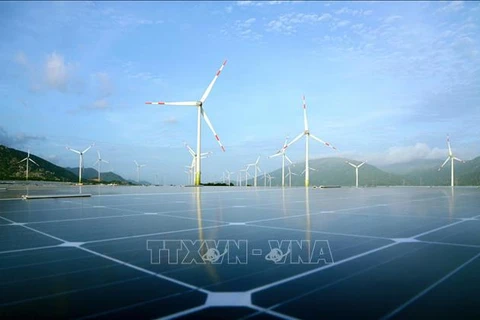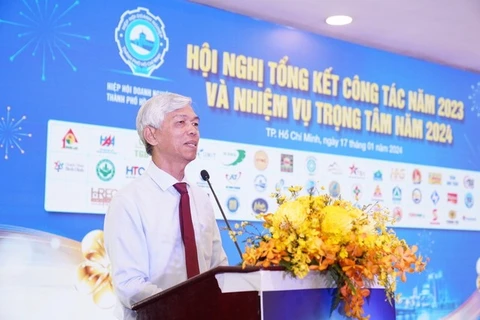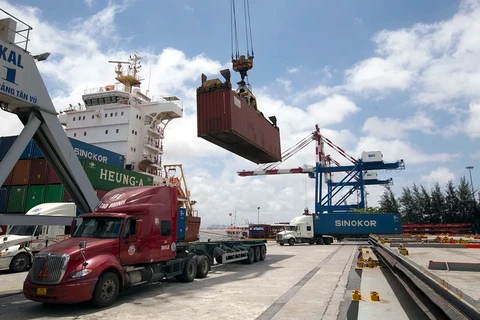Hanoi (VNA) - Achievements have been made in the implementation of the National Green Growth Strategy. Nevertheless, this marks only the outset, with numerous opportunities and challenges awaiting on the horizon.
Vietnam has achieved important milestones in socio-economic development and innovation. However, the country still lags behind in average income per capita and technological transformation compared to countries in the region and globally.
Therefore, achieving the goals of Green Growth will bring significant and long-term benefits.
Various significant achievements have been made in the implementation of the National Green Growth Strategy for the 2021-2030 period, with a vision towards 2050. However, this marks only the outset, with numerous opportunities and challenges awaiting on the horizon.
VietnamPlus had an interview with Deputy Minister of Planning and Investment Nguyen Thi Bich Ngoc to further clarify the issue.
Early establishment of Green Classification System
- Green growth is both a potential and a challenge for Vietnam. What is the Deputy Minister's perspective on this remark?
Deputy Minister Nguyen Thi Bich Ngoc: Green growth is a global trend and an inevitable development path. Vietnam has many advantages in terms of nature, as well as social and human factors, providing immense potential for Green Growth.
The abundant carbon reserves come from natural forest resources, accounting for over 40% of the country's total land area.
Additionally, the hot and humid weather in the sub-equatorial region allows the development of tropical forests with large carbon reserves.
Vietnam possesses strong potential for the development of renewable energy, thanks to its geographical location in the sunny sub-equatorial region with a long coastline and abundant wind.
With a population exceeding 100.3 million, domestic consumers are increasingly aware of environmental factors, health, and are willing to pay more for green products.
Currently, Vietnam’s digital economy sees the fastest growth in the region, with a market scale of around USD 23 billion USD in 2022 which is expected to reach 50 billion USD by 2025.
Despite the strong growth momentum, Vietnam's Green Economy is still in its early stages and faces many challenges.
The system of strategies with various goals, orientations, and actions in the Green Growth Strategy and Action Plan has not been fully detailed, especially in specialized, inter-sectoral, and local content.
 The green classification system is a particularly important prerequisite for the development of the Green Economy. (Photo: VNA)
The green classification system is a particularly important prerequisite for the development of the Green Economy. (Photo: VNA) Five specific actions for Green Growth
- As the leading national agency for Green Growth, how has the Ministry of Planning and Investment collaborated with other ministries, sectors, and localities to implement Green Growth, Deputy Minister?
Deputy Minister Nguyen Thi Bich Ngoc: The Ministry of Planning and Investment, in its role as the leading national agency for Green Growth, provided advice to the Government and the Prime Minister to issue the National Green Growth Strategy for the 2021-2030 period, with a vision to 2050.
To realise the goals in the strategy, the ministry has coordinated with other ministries, sectors, and localities to focus on constructing and implementing the National Action Plan on Green Growth for the 2021-2030 period.
The Action Plan approved by the Prime Minister includes 18 themes, 57 specific mission and action groups, and 134 concrete tasks and activities.
The National Steering Committee on Green Growth was established, tasked with researching and proposing directions and solutions to address important, inter-sectoral issues related to Green Growth to the Prime Minister.
Currently, various ministries, sectors, and localities have developed and issued their own action plans for Green Growth.
 The goals and contents of Green Growth are integrated into the strategies, plans, and development plans of various industries, sectors, and localities. (Photo: Vietnam+)
The goals and contents of Green Growth are integrated into the strategies, plans, and development plans of various industries, sectors, and localities. (Photo: Vietnam+) Ministries, sectors, and localities have taken specific actions, such as proactively researching, promoting negotiations, and implementing new mechanisms to mobilize maximum resources from external sources for Green Growth.
They have enhanced international cooperation, exchanged experiences in promoting Green Growth while simultaneously intensifying efforts to promote investment and implement sustainable and environmentally-friendly projects from corporations and businesses across all economic sectors.
- Would the Deputy Minister share the implementation plan for the tasks in the National Action Plan on Green Growth?
Deputy Minister Nguyen Thi Bich Ngoc: In the coming time, the Ministry of Planning and Investment, in its lead role, will continue to closely coordinate with other ministries, sectors, and localities to focus on implementing the following tasks:
Firstly, enhance inter-sectoral coordination based on regular information sharing and timely cooperation in implementing the tasks and activities assigned in the National Action Plan on Green Growth.
Secondly, carry out activities to establish mechanisms, policies, and enhance the mobilisation of financial resources and promote investment, especially private investment in Green Growth.
This includes allocating and using public investment in line with specific criteria for reducing greenhouse gas emissions in national, sectoral, and local projects; reviewing and improving the existing legal framework and establishing mechanisms, preferential policies for investment in green transformation.
Thirdly, strongly promote public-private partnership to lead the country towards the net zero goal, recognising private resources as the key and most important source.
 The intensive promotion of close public-private partnership is crucial to steer the country towards the net zero goal. (Photo: Vietnam+)
The intensive promotion of close public-private partnership is crucial to steer the country towards the net zero goal. (Photo: Vietnam+) Fourthly, study and develop a "Roadmap to realize Green Growth goals linked to socio-economic development goals in the direction of carbon neutrality."
Accordingly, Green Growth goals will be specifically determined, both qualitatively and quantitatively, based on multi-criteria analysis, modeling development scenarios, and a comprehensive assessment of the socio-economic and environmental impacts, aiming for net zero emissions by 2050.
Fifthly, establish a mechanism to monitor, evaluate and report on the implementation of the Strategy, especially setting the national Green Growth targets, developing and implementing a pilot Green Growth Index to assess the level of Green Growth implementation nationwide.
In addition, widespread awareness-raising activities will continue to be implemented at all agencies, organisations, businesses, and especially the community.
Information will be provided to foster community understanding that this constitutes a collective effort, with individuals encouraged to actively contribute to the implementation of Green Growth, aligning with Vietnam's goal of achieving net zero.
The Ministry of Planning and Investment, along with relevant ministries, sectors, and localities, will always accompany and create the best support conditions regarding mechanisms and policies for businesses, investors, and related parties to confidently continue investing, doing business, and working in Vietnam. The highest goal is to ensure harmonious development between the economy, society, and the environment, towards the long-term sustainable development of the country.
- Thank you, Deputy Minister!























